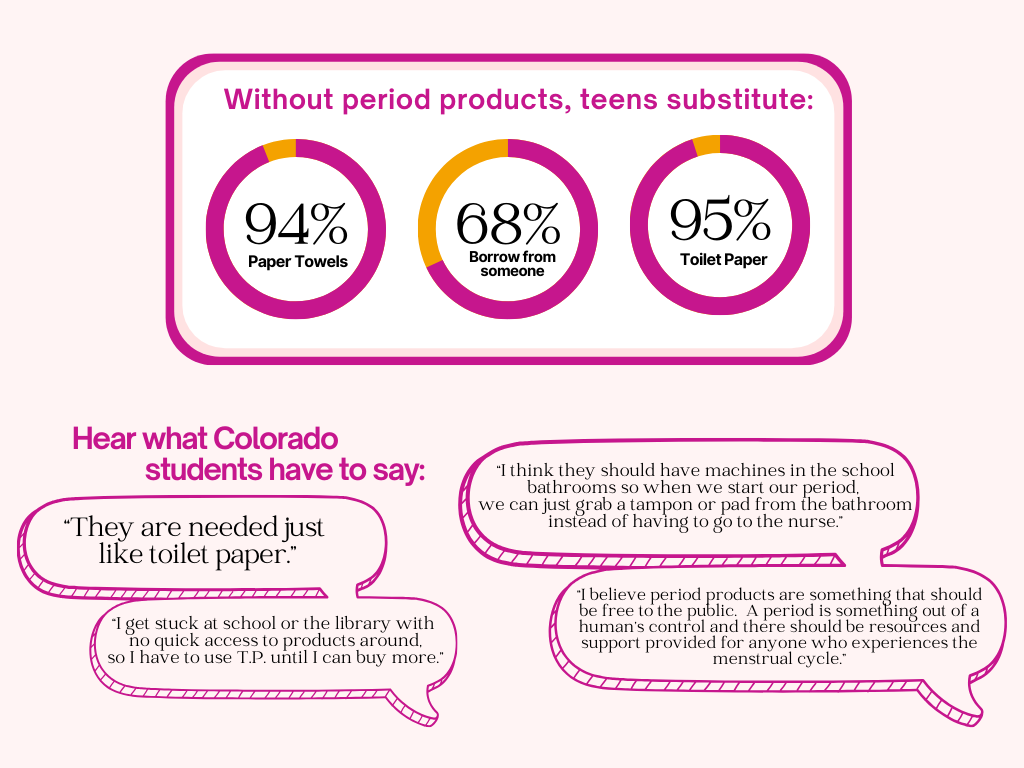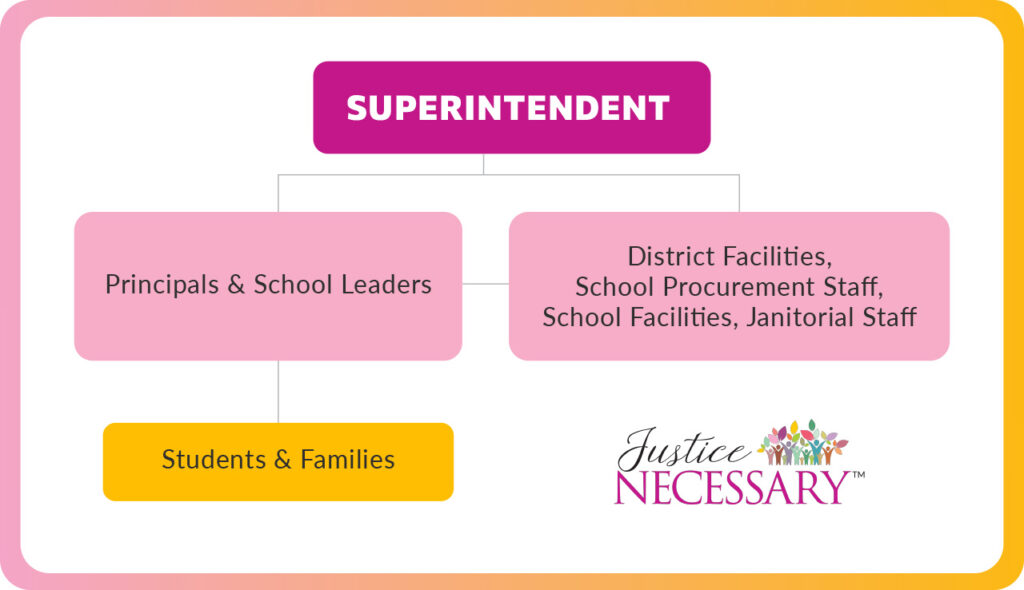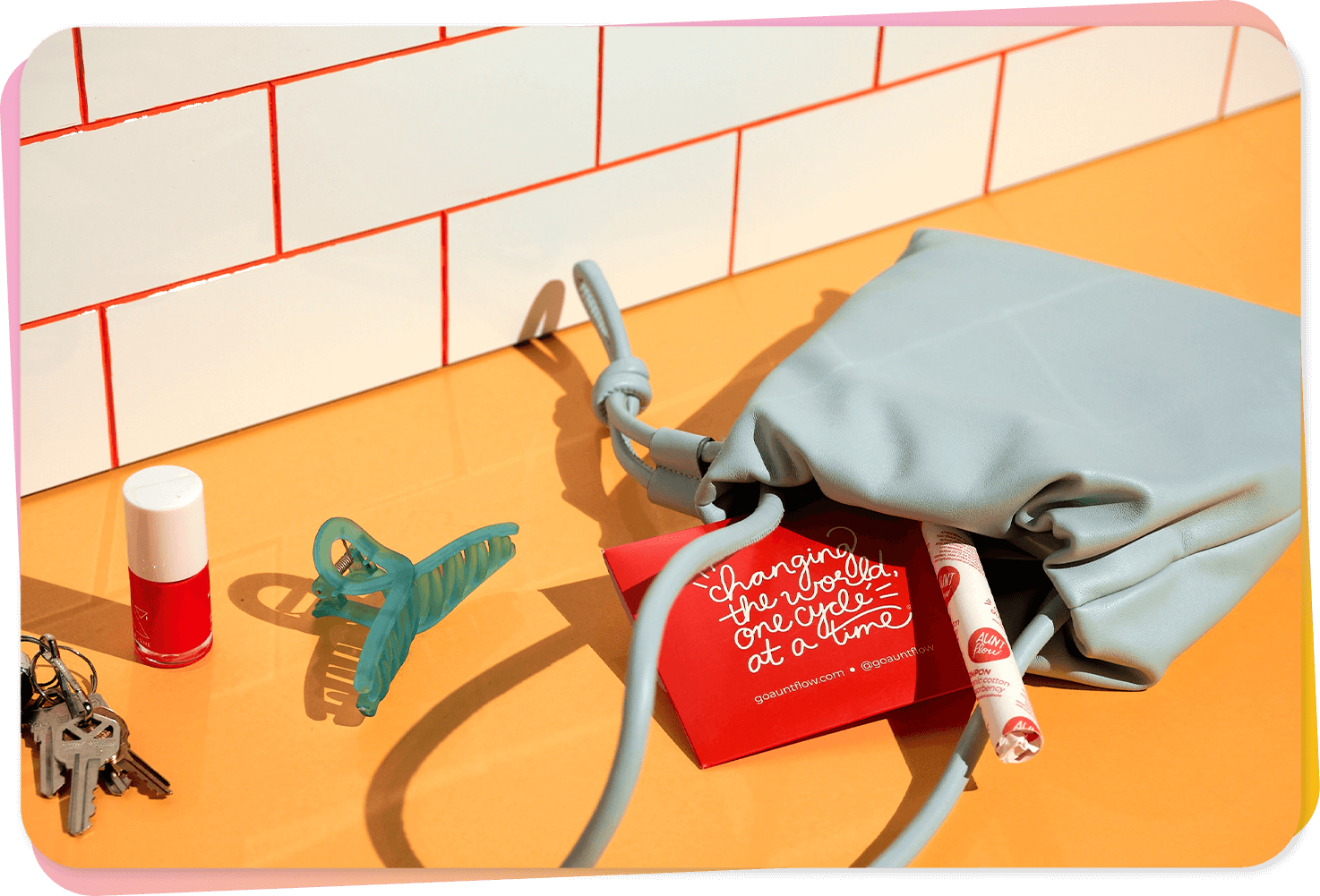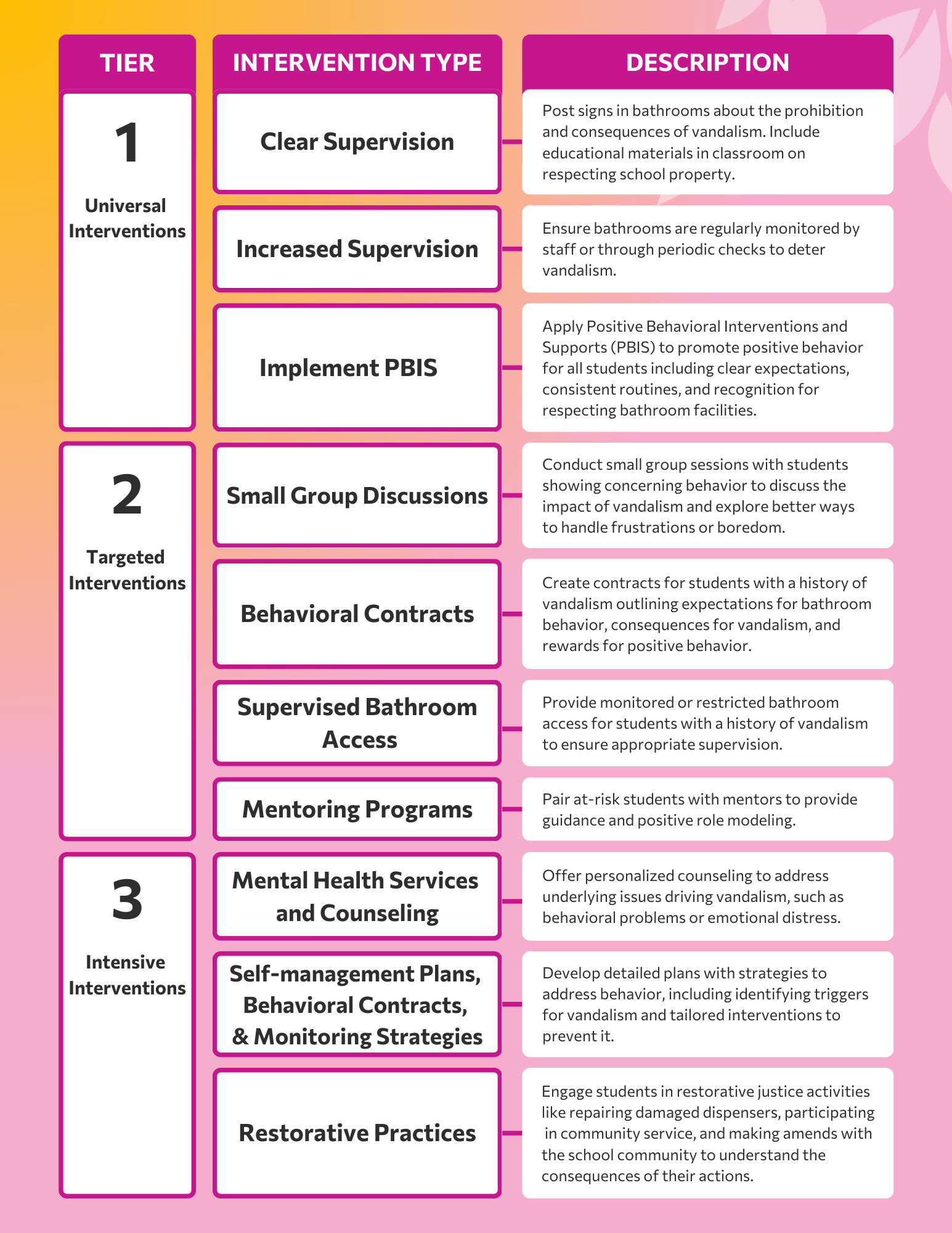

Now, it’s time to ensure every school in Colorado has period products available.
We have one school year to gear up – by June 30, 2025, each school needs to have 25% of their female and gender-neutral restrooms stocked with menstrual products.
This resource guide is here to support you every step of the way.
Ready to make this change happen? Let’s get started!
Justice Necessary has brought together a team of experts to create a comprehensive toolkit designed to support Colorado schools in implementing HB24-1164, the “Free Menstrual Products to Students”. This page is your go-to resource, offering a variety of supportive tools and information tailored to help schools navigate the implementation process with confidence and ease.
Our toolkit includes practical resources, step-by-step guides, and best practices for ensuring that all students have access to free menstrual products, promoting equity and well-being in our educational spaces. In addition to our focus on schools, we also offer valuable resources for families, helping them understand this important initiative and how it supports students’ success in the classroom.
Sign up today to stay informed about the latest resources, updates, and additions to our toolkit.

Beginning this school year, Colorado law requires menstrual products to be available free of charge to students in grades 6-12 in applicable student bathrooms. This law applies to all Colorado public schools, including district schools, district charter schools, institute charter schools, boards of cooperative services, Colorado School for the Deaf and Blind and facility schools.
An “applicable student bathroom” means a female-designated or gender-neutral bathroom that is used by students in grades 6-12. If a school does not have gender-neutral bathrooms, products must be available in a health or nurse’s office or the main office in addition to a female-designated bathroom. There is an exception for K-6 schools. For these schools, the law allows for the products to be available in a health or nurse’s office or the main office instead of in the bathrooms. For K-8 schools, products only need to be provided in the applicable bathrooms that primarily serve the students in grades 6-8. Schools may remove products from a bathroom if vandalism or destruction of school property occurs in that bathroom due to providing these products. When products are not available in a bathroom for any reason, there needs to be signage as to where students can find the products in the school.
The bill is in effect beginning the 2024-2025 school year. The law also phases in the implementation to provide time for schools to meet compliance.
Small rural schools, including charter schools, the Colorado school for the deaf and the blind, and approved facility schools are exempted from the timeline above but must comply with the law by June 30, 2028.
Grant funding is available through the Colorado Menstrual Hygiene Products Accessibility Grant program run by the Colorado Department of Education (CDE). Eligible schools and districts may apply for funding to acquire products, dispensing machines and disposal receptacles. More information is available through CDE.
Beginning this school year, Colorado law requires schools to provide menstrual products, such as tampons and pads, to be available free of charge to students in grades 6-12. This law applies to all Colorado public schools, including charter schools, facility schools and Colorado School for the Deaf and Blind.
These products must be available in all female bathrooms used by 6-12 grade students as well as any gender-neutral bathroom. If a school does not have gender-neutral bathrooms, products can be kept in the health/nurse’s office or the main office. One exception is for a K-6 school – in this case, the products do not need to be in the bathrooms but do need to be available in the health/nurse’s office or main office.
If any vandalism or damage is caused in a bathroom because of these products, the school can take the products out of the bathroom, but the school needs to post information about other locations where products can be found in schools.
Schools have time to fully put this law into effect. By the end of June 2025, schools must have products in 25% of the bathrooms. This increases by 25% each year until June 2028 when products need to be in all the bathrooms. Schools in small rural school districts (those with fewer than 1,200 students district wide), including charter schools located in these areas, facility schools, and the Colorado School for the Deaf and the Blind may wait until June 30, 2028 to put products in their bathrooms.
Colorado school districts and charter schools can get funding for providing free menstrual products in their schools. The Colorado Department of Education runs the Menstrual Hygiene Products Accessibility Grant program and has provided funding to eligible schools since 2021 to purchase products and dispensers. The grant cycle opens in the fall and is dependent on funding allocated by the Colorado legislature. Eligible applicants are Colorado school districts and charter schools that enroll 50% or more students eligible for free or reduced-price lunch, small rural school districts and charter schools in those areas, facility schools, and the Colorado School for the Deaf and Blind.
The grant application period is open until November 7, 2024. Sign up and we will keep you informed as new funding opportunities become available.
The stigma surrounding periods isn’t just about embarrassment; it directly undermines both the health and educational success of menstruating students.
Misinformation and shame around menstruation leave students vulnerable. Period-related teasing or judgment can make a school feel like an unsafe space, hindering students’ ability to learn.
Two-thirds of teens stress about having the right supplies, impacting their focus, and creating dilemmas with health repercussions. For example, the fear of being caught unprepared could lead to unhealthy practices like wearing a tampon or pad for too long, risking infections or even toxic shock syndrome.
Period poverty refers to the lack of access to menstrual products such as sanitary pads, tampons, or menstrual cups. Five hundred million people worldwide lack access to basic menstrual products and hygienic facilities (World Bank, 2023).
However, period poverty isn’t just an international problem; it affects menstruating adults and K-12 students in the United States, too. In the United States alone, 16.9 million menstruating individuals live in poverty, and two-thirds cannot afford menstrual products.
Managing a “period” isn’t just about having the right supplies. It includes ensuring that menstruators have everything they need to stay comfortable, healthy, and included during their periods. This means:
Privacy: Having a safe, private space to change pads, tampons, etc., whenever they need to without feeling awkward.
Cleanliness: Easy access to soap and water for washing hands and staying clean.
Disposal: Proper places to throw away used pads, tampons, and other supplies.
Knowledge: Understanding accurate information about how to manage their menstrual cycle.
Period poverty is also exacertbated by stigma that surrounds openly discussing both periods and poverty.

The law phases in the implementation to provide time for schools to meet compliance.
Small rural schools, including charter schools, the Colorado school for the deaf and the blind, and approved facility schools are exempted from the timeline above but must comply with the law by June 30, 2028.
By providing period products to students attendance has increased attendance by 2.4% students focus on learning, decreasing absenteeism, and fully participating in school and extracurricular activities.
All Colorado public schools, including district schools, district charter schools, institute charter schools, boards of cooperative services, Colorado School for the Deaf and Blind and facility schools.
This new law requires that period products be available in girls’ restrooms and gender-neutral restrooms in all schools with grades 6-12. Products must also be found in a school’s health or main office if there are no gender-neutral bathrooms. For K-6 schools, products only need to be available in the health or main office. All schools must clearly indicate where students can find period products within the building.
Schools can offer pads or tampons.
School staff will be responsible for regularly stocking and maintaining the products.
We recommend that schools conduct an initial needs assessment to determine the students’ needs. But at a minimum, schools should install period products, educate students about the availability of products, and establish a maintenance schedule. We also recommend training staff on how best to respond to vandalism or misuse of period products. Justice Necessary has resources to support schools further if they so choose.
No, there are no required educational components associated with this.
Schools can use various communication methods that meet their current processes, such as announcements, posters, and newsletters, to inform students about the availability and location of period dispensers.
Justice Necessary provides resources to help schools communicate this information effectively. Connect with Justice Necessary for further support and sign up JusticeNecessary.org/StudentSuccess to stay informed about new resources.
Parents and community members can support the initiative through advocacy, donations, and by participating in awareness programs to promote the importance of menstrual equity in schools.
Justice Necessary offers multiple ways to support this initiative including an online toolkit, team members who can answer questions, period packing parties to create one-month period bags for students, packing parties to create “in-a-pinch” envelopes with period products for students to support students and much more. To join a packing party, volunteer, or find out other opportunities to support students and others , go to JusticeNecessary.org/get-involved.
We encourage schools to identify or designate a contact person or team, or a specific department that is responsible for managing the policy implementation as well as addressing any questions or concerns from teachers, school staff, students, or families.
Schools with limited resources should seek assistance from the Menstrual Hygiene Products Accessibility Grant from the Colorado Department of Education (CDE). They can also explore partnerships with local nonprofits or community organizations that can provide support and resources, explore additional grants, community partnerships.
Justice Necessary has opportunities for schools to secure support for dispensers, products, receptacles, in a pinch period products for students as well as one-month bags of products for students during vacations
To inquire about other opportunities, go to Justice Necessary.
Justice Necessary provides recommendations to schools on how to address vandalism or misuse. We encourage schools to utilize clear signage about the consequences of vandalism or misuse, regularly monitor the products and develop responses that are student focused and align with the school’s culture. Schools may also implement educational sessions to encourage responsible use of the dispensers. In the event of repeated misuse, schools will have protocols in place, such as moving dispensers to more supervised areas or increasing awareness among students about the importance of these resources. More information on period product vandalism and responses are available here.
We encourage schools to ensure that all restrooms are equipped with appropriate disposal bins and train operational staff to maintain them. Also, we encourage schools to provide support to students on how to properly dispose of products to avoid issues of misuse.
Justice Necessary provides resources to support school teams. Go to Justice Necessary.
We encourage schools to train staff on assisting students with disabilities as well as consider providing menstrual products in a variety of locations that include accessible restrooms and offices like the health office.
Justice Necessary can provide further resources to support schools.
As well as tools to help schools assist their students. Contact Justice Necessary with questions.
While schools may choose to provide a variety of menstrual products, they may not be able to accommodate every specific brand or type. If a student has a particular need, they should speak with the school nurse or designated staff member about their need.
Justice Necessary can also provide you with a list of other products and companies. For further information, contact Justice Necessary
The cost of implementing and maintaining this program will vary depending on the resources each school or school district decides to allocate. While funds are available through the CDE Menstrual Equity Grant, Justice Necessary has opportunities for schools to secure support for dispensers, products, receptacles, in a pinch period products for students as well as one-month bags of products for students during vacations. Schools can also explore additional grants, community partnerships, and consider planning for this expense in future district budgets.
To inquire about other opportunities, go to Justice Necessary.
The law phases in the implementation to provide time for schools to meet compliance.
Small rural schools, including charter schools, the Colorado School for the Deaf and Blind, and approved facility schools are exempted from the timeline above but must comply with the law by June 30, 2028.
By providing period products to students, attendance has increased attendance by 2.4% and students focus on learning, decreasing absenteeism, and fully participating in school and extracurricular activities.
All Colorado public schools, including district schools, district charter schools, institute charter schools, boards of cooperative services, Colorado School for the Deaf and Blind and facility schools.
This new law requires that period products be available in girls’ restrooms and gender-neutral restrooms in all schools with grades 6-12. Products must also be found in a school’s health or main office if there are no gender-neutral bathrooms. For K-6 schools, products only need to be available in the health or main office. All schools must clearly indicate where students can find period products within the building.
Schools can offer pads or tampons.
Products are required to be in the bathrooms that students use to ensure privacy. We encourage schools to train staff on how to handle the topic appropriately and educate students to promote positive behavior and deter problems.
This is not part of the legislation.
Absenteeism: The act of being frequently absent from school, which, in the context of period poverty, can occur when menstruating students miss school due to a lack of access to menstrual products.
Charter Schools: Publicly funded independent schools that operate under a charter, which may be affected by policies related to the provision of menstrual products in schools.
Colorado Department of Education (CDE): The Colorado Department of Education (CDE) is the state agency responsible for overseeing public education in Colorado. It provides leadership, resources, and support to school districts, educators, and students across the state to ensure quality education and equitable opportunities. The CDE is involved in various initiatives, including the implementation of educational policies, administration of state and federal funding, and support for programs such as the Menstrual Hygiene Products Accessibility Grant Program.
Free Menstrual Products in Schools: A policy initiative aimed at providing menstrual hygiene products at no cost within school settings to ensure that all students have access to the necessary products during the school day.
Gender Gap in Education: The disparity in educational opportunities and outcomes between genders, often exacerbated by factors like period poverty that disproportionately affect menstruating students.
Giving Party/Packing Party: Individuals coming together to create a 1-month supply of period products. It is an opportunity to raise awareness, raise funds and products to provide supplies for those who are experiencing period poverty.
House Bill 24-1164 (HB24-1164): A legislative act aimed at ensuring access to free menstrual products for students in Colorado schools, addressing period poverty and promoting menstrual equity.
Menarche: “Menarche is defined as the first menstrual period in a female adolescent. Menarche typically occurs between the ages of 10 and 16, with the average onset being 12.4 years”- Lacroix et al., 2022.
Menstrual Equity: The concept that menstruating individuals should have access to the necessary resources, products, and facilities to manage their menstruation with dignity and without stigma, cost, or other barriers. Menstrual Health: A state of complete physical, mental, and social well-being in relation to menstruation, not just the absence of disease or infirmity.
Menstrual Health/Menstrual Hygiene: “Menstrual health is a state of complete physical, mental, and social well-being and not merely the absence of disease or infirmity, in relation to the menstrual cycle.”- Hennegan et al., 2021
Menstrual Hygiene Education: Programs and initiatives aimed at educating students and communities about menstruation, menstrual health, and the importance of proper menstrual hygiene practices.
Menstrual Hygiene Management (MHM): The practice of using clean menstrual hygiene products to absorb or collect menstrual blood, ensuring access to privacy and facilities to change the products, and providing information and education about menstruation.
Menstrual Hygiene Products: Items used to manage menstruation, such as pads, tampons, menstrual cups, and other absorbent products.
Menstrual Hygiene Products Accessibility Grant Program: A program established to provide funding to schools for the provision of free menstrual products to students, ensuring access regardless of financial barriers.
Menstrual Supplies: “Menstrual hygiene materials are those used to catch menstrual flow, such as cloths, reusable and disposable pads, menstrual cups and tampons. Menstrual supplies are other supportive items for menstrual hygiene and health more broadly, such as soap, underwear and pain relief”- UNICEF, 2019.
Menstruation/Menses: “Menstruation is normal discharge of blood and tissue from the uterine lining through the vagina that occurs as part of a monthly menstrual cycle”- U.S. Department of Health and Human Services.
Menstruator: A person who menstruates/has a period.
Period Poverty: The lack of access to menstrual products, education, hygiene facilities, waste management, or a combination of these, which can negatively affect the lives of menstruating individuals.
Period Poverty: “Period Poverty has been defined by the American Medical Women’s Association as inadequate access to menstrual hygiene tools and education, “including but not limited to sanitary products, washing facilities, and waste management.”
Rural School Districts: School districts located in less populated areas, often with limited access to resources, including those necessary for menstrual hygiene management. In Colorado less than 6,500 students
Small Rural School Districts: School districts located in less populated areas, often with limited access to resources, including those necessary for menstrual hygiene management. In Colorado less than 1,000 students
Stigma: A negative social attitude or discrimination against individuals based on menstruation, which can result in shame, embarrassment, or reluctance to discuss menstrual health issues.
Toxic Shock Syndrome (T.S.S.): “Toxic shock syndrome (TSS) is a serious illness that affects multiple systems of the body and is caused by toxins released by certain bacteria… TSS is rare. Recognized groups at risk of S. aureus TSS include menstruating women using tampons, menstrual cups, or other inserted devices, women using diaphragms or contraceptive sponges, and anyone with a S. aureus infection of another body site.”- Virginia Department of Health.
Urogenital Diseases: Infections and conditions affecting the urinary and genital organs, which can be exacerbated by poor menstrual hygiene practices, such as extending the use of menstrual products beyond recommended timeframes.

1. Ideological vandalism is a type of property damage motivated by political, religious, or social beliefs. It’s a deliberate act aimed at making a statement or expressing a viewpoint through the destruction or defacement of property.
2. Vindictive vandalism is destructive behavior motivated by a desire to cause harm or revenge. It often targets specific individuals or groups and is driven by personal animosity rather than broader ideological beliefs.
3. Play vandalism generally refers to acts of destruction or misuse that are seemingly without a clear motive other than a desire to cause disruption or mischief. It often involves a sense of playfulness or curiosity, but the actions result in damage or inconvenience.
is a type of property damage motivated by political, religious, or social beliefs. It’s a deliberate act aimed at making a statement or expressing a viewpoint through the destruction or defacement of property.
is a destructive behavior motivated by a desire to cause harm or revenge. It often targets specific individuals or groups and is driven by personal animosity rather than broader ideological beliefs.
generally refers to acts of destruction or misuse that are seemingly without a clear motive other than a desire to cause disruptions or mischief. It often involves a sense of playfulness or curiosity, but the actions result in damage or inconvenience.
Restorative justice is a way of responding to wrongdoing that focuses on healing the harm caused, rather than simply punishing the offender. Inspired by indigenous wisdom, it brings together everyone affected by harm to address the damage done and find solutions that repair relationships and strengthen the community. This approach values open communication, mutual support, and cooperation over isolation and punishment. Before implementing any restorative justice, it’s crucial to fully understand the harm caused by the ideological vandalism. This
includes:
Impact on individuals: How has the vandalism affected those who rely on the period products?
Impact on the community: What message does the vandalism send about the community’s values?
Impact on the environment: Consider the environmental implications of the vandalism, such as waste and pollution.
Access to period products is crucial for students’ health and equal access to participation in school, so what can be done if these products and their supply stations (e.g dispensers, baskets, etc.) face vandalism? Research shows that effective practices for promoting positive school environments include Supportive and Restorative strategies, which guide students toward positive behavior through encouragement, clear expectations, and proactive measures, rather than relying solely on punishment or zero-tolerance. These strategies aim to support students in understanding and meeting behavioral expectations while addressing underlying issues that may contribute to misbehavior. Restorative approaches can be implemented at both the universal and individual-student level. Here are some evidence-based restorative interventions to address vandalism while ensuring students continue to have access to hygiene products.
MTSS, or Multi-Tiered System of Supports, is a comprehensive framework designed to help all students succeed through a continuum of support. It operates on three levels of intervention:
Tier 1: Provides universal support to all students, incorporating basic instruction and general help integrated into regular classroom teaching. For issues like vandalism in school bathrooms, Tier 1 interventions include strategies such as posting clear signage to discourage vandalism and educating students about the importance of respecting school property. Increased supervision and the implementation of Positive Behavioral Interventions and Supports (PBIS) also fall under this tier, aiming to promote positive behavior and establish clear expectations.
Tier 2: Focuses on more targeted support for students who need additional help. This may involve small group discussions addressing vandalism and its impact, creating behavioral contracts with students who have shown concerning behavior, and offering supervised bathroom access to those at higher risk. Mentoring programs can also be implemented to guide at-risk students and provide positive role models.
Tier 3: Involves intensive, individualized support for students engaged in repeated or severe vandalism. This tier includes personalized counseling to address underlying issues, developing self-management plans and specific behavioral contracts, and utilizing restorative practices such as repairing damage and participating in community service.
Using these interventions at each tier helps to address vandalism to supply stations and products comprehensively, providing both preventive measures and targeted support for students. Schools that do not use an MTSS framework can select interventions identified throughout the tiers as a tailored, individualized school and student approach to address vandalism. The goal of MTSS is to make sure every student gets the help they need to succeed in school. Examples of addressing vandalism targeting supply stations and their products in bathrooms can be approached through the MTSS framework as follows:


2000 S. Colorado Blvd.,
Tower One Suite 2000
Denver, CO 80222
Copyright © 2022 Justice Necessary. Privacy Terms